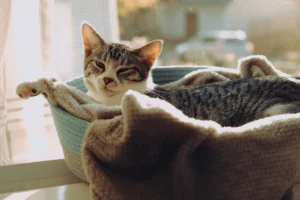Vitamin B12 plays a crucial role in the health of cats, yet many cat owners may overlook the importance of ensuring their furry companions receive adequate amounts. When a cat is lacking this essential nutrient, the consequences can be more than troubling.
Vitamin B12 injections can help boost your cat’s energy levels, support proper digestion, and protect against conditions such as anemia and neurological issues. Administering this treatment can lead to significant improvements in a cat’s overall well-being.
What is Vitamin B12 and Why is it Important?
Vitamin B12, also known as cobalamin, plays a crucial role in your cat’s overall health. It’s vital for metabolism, specifically in converting fats and proteins into energy. Without adequate B12, a cat’s energy levels can plummet, leading to lethargy and malaise.
Another essential function of Vitamin B12 is its support for the nervous system. It helps maintain the integrity of nerve cells and is involved in the synthesis of DNA. A deficiency in B12 can lead to neurological issues, impacting motor functions and behavior.
A fascinating aspect of Vitamin B12 is how it’s absorbed. Cats mainly get B12 from animal sources, like meat. However, certain health conditions, such as gastrointestinal disorders or pancreatitis, can hinder absorption, making Vitamin B12 injections an effective way to help cats regain their health. Regular monitoring and veterinary guidance ensure your feline friend receives the proper care they need.
What Are the Symptoms of Vitamin B12 Deficiency?
Recognizing the signs of Vitamin B12 deficiency in cats is essential, especially if they’re displaying any concerning behaviors. Common symptoms to watch for include:
- Lethargy: Persistent tiredness or lack of energy.
- Poor appetite: A noticeable drop in interest in food.
- Weight loss: Unexplained shedding of pounds, which could signal a serious health issue.
- Vomiting or diarrhea: Digestive troubles that can further exacerbate nutrient absorption problems.
- Weakness: A general sense of frailty or lack of coordination.
If you notice any combination of these symptoms, it’s time to consult your veterinarian. Early detection and treatment can significantly improve your cat’s health and quality of life. For a deeper understanding of feline nutrition and Vitamin B12, the Cornell University College of Veterinary Medicine offers valuable resources and guidance.
Getting them that B12 injection might just be the boost they need!
Who Needs Vitamin B12 Injections?
Some cats are more prone to B12 deficiencies than others, particularly those grappling with certain medical conditions or dietary restrictions. Cats with chronic gastrointestinal issues, such as inflammatory bowel disease (IBD) or pancreatitis, can struggle to absorb this vital nutrient effectively. Because their diet doesn’t provide adequate amounts of B12, these furry friends often require supplementation.
Additionally, older cats or those suffering from kidney disease may also benefit from B12 injections, as they tend to have lower levels of this vitamin. If your cat follows a strict vegetarian or homemade diet, they might not get enough B12, since it’s predominantly found in animal products. Even if your cat is generally healthy, a routine blood test can reveal deficiencies that might warrant supplementation.
Some signs that your cat may need B12 injections include lethargy, weight loss, or poor appetite. Consistent monitoring by a veterinarian is crucial—early intervention can lead to a quicker recovery and improved quality of life.
How Are Vitamin B12 Injections Administered?
Administering Vitamin B12 injections is fairly straightforward, but it’s essential to have a vet show you how to do it properly if you’re considering the at-home route. Typically, these injections are given subcutaneously, meaning they’re injected just under the skin. This method is less invasive and usually causes minimal discomfort.
Dosage and frequency can vary based on your cat’s individual needs, but commonly, cats receive an injection every 1–3 weeks. Dosing will depend on the specific condition being treated; 2,000 to 5,000 mcg is a general guideline, but always follow your vet’s recommendations.
For your cat’s comfort during this process, try to use a quiet, calm space. Hold them gently but firmly to prevent any sudden movements. It might take a few tries to feel confident, and that’s completely normal! If you’re ever unsure, don’t hesitate to consult your vet—they’re there to help you and your pet have a smooth experience.
For a more detailed guide on administering injections to pets, check out the ASPCA’s resources here.
One last tip: Rewarding your cat with treats after the injection can help create a positive association, making future sessions easier for both of you.
Are There Side Effects to Vitamin B12 Injections?
Vitamin B12 injections are generally safe and beneficial for cats, especially those dealing with conditions like malabsorption, gastrointestinal issues, or appetite loss. However, it’s wise to be aware of potential side effects.
Most cats tolerate the injections well, but some may exhibit mild reactions like swelling or redness at the injection site. In rare cases, you might notice an allergic reaction leading to symptoms such as vomiting, diarrhea, or lethargy. It’s important to keep an eye on your cat right after the injection. Also, if your cat displays unusual behaviors or if the injection site seems to cause them pain, it’s best to consult your vet quickly.
In conclusion, while side effects can occur, they are typically minor. Regular monitoring can help catch any rare reactions early on, ensuring your feline friend stays healthy and happy.
How to Monitor Your Cat After an Injection
After your kitty receives a Vitamin B12 injection, watching for specific signs can help ensure everything’s going smoothly. Here are some guidelines:
- Observe Injection Site: Look for redness, swelling, or discharge. These could indicate an infection or reaction.
- Monitor Behavior: Is your cat more lethargic than usual? A slight drop in energy is normal, but excessive tiredness isn’t.
- Check Appetite and Drinking: Is your cat eating and drinking normally? A decrease in appetite post-injection should be briefly monitored; if it lasts over 24 hours, give your vet a call.
- Watch for Digestive Changes: If they experience vomiting or diarrhea, note how severe or frequent it is, as these can be signs of discomfort or an allergic reaction.
- Look for Signs of Allergies: Observe for any signs like itching, excessive grooming, or rash.
It’s essential to have a vet visit scheduled if any concerning signs arise. Keeping a log of your cat’s behavior and any odd symptoms can be helpful for your veterinarian. For further reading on monitoring pets post-injection, the Cornell University College of Veterinary Medicine offers great resources here.
Can Cats Get Enough Vitamin B12 from Their Diet?
Vitamin B12 , also known as cobalamin, is essential for your cat’s health, particularly in supporting the nervous system and aiding in the production of red blood cells. While many commercial cat foods are designed to meet the nutritional needs of felines, the question arises: Is there enough B12 in these diets?
Cats are obligate carnivores, which means their bodies thrive on meat. Fortunately, animal-based proteins are rich sources of Vitamin B12. In theory, a well-balanced diet of high-quality commercial cat food should provide adequate amounts of B12. However, certain conditions like gastrointestinal issues or specific health problems can hinder a cat’s ability to absorb this crucial nutrient from food.
Here are a few factors that might necessitate dietary adjustments:
- Health conditions: Cats with pancreatitis or those on certain medications may need additional B12.
- Homemade diets: If you’re preparing meals for your cat at home, it’s crucial to ensure they include appropriate sources of B12, like organ meats or fish.
- Senior cats: Older cats often have diminished absorption capabilities, so they might benefit from extra supplementation.
If you’re unsure about whether your cat’s diet meets their needs, it’s wise to consult your vet. They might recommend a B12 injection if your furball’s levels are low or if there’s a risk of deficiency.
Interesting Facts about Vitamin B12
Beyond its critical role in your cat’s diet, Vitamin B12 boasts some fascinating aspects that might surprise you. Here are some unique insights about this nutrient:
Absorption relies on intrinsic factor : For B12 to get absorbed, it needs a protein called intrinsic factor, which is produced in the stomach. If your cat has stomach issues, it might struggle to absorb B12 effectively.
Deficiency symptoms : Signs of B12 deficiency in cats can include lethargy, weight loss, and poor coat condition. If you notice these signs, a visit to the vet is in order.
Supplementation : Injections can quickly raise B12 levels, making it an effective treatment for deficiencies. These are particularly useful because they bypass the digestive system, which can sometimes be impaired.
It’s generally safe : B12 injections are typically safe for cats and have few side effects. This makes them a common choice when addressing deficiencies.
For anyone looking to dive deeper, the American Association of Feline Practitioners offers excellent resources on feline nutrition and health, which can help clarify any questions regarding Vitamin B12 and overall cat wellness. Check their site here.
Ensure your furry friend is getting all the nutrients they need, and don’t hesitate to reach out to your vet if you suspect they might be lacking in anything, especially Vitamin B12!
Alex, a passionate animal lover, has experience in training and understanding animal behavior. As a proud pet parent to two dogs and three cats, he founded AnimalReport.net to share insights from animal experts and expand his knowledge of the animal kingdom.




